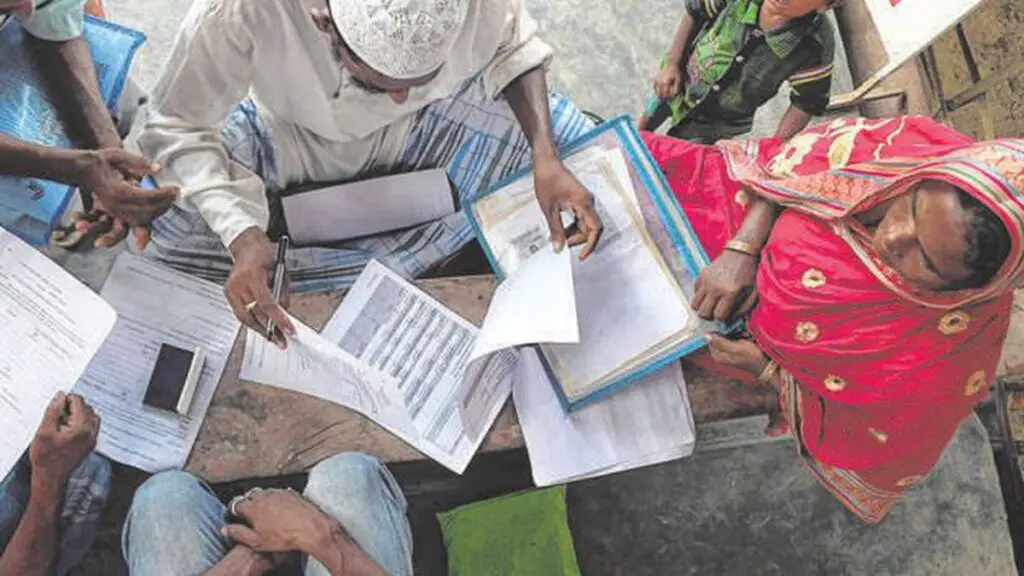The Supreme Court to Hear Constitutional Validity of Section 6A of Citizenship Act in Assam
The Supreme Court has announced that it will commence hearings on December 5 to examine the constitutional validity of Section 6A of the Citizenship Act pertaining to illegal immigrants in Assam. Section 6A was inserted as a special provision to address the citizenship of individuals covered by the Assam Accord. This provision states that those who arrived in Assam between January 1, 1966, and March 25, 1971, from specified territories, including Bangladesh, must register themselves under Section 18 for citizenship if they have been residing in Assam since then. Notably, March 25, 1971, serves as the cutoff date for granting citizenship to Bangladeshi migrants in Assam.
Postponement of the Hearing
The matter was deferred by a Bench led by Chief Justice D. Y. Chandrachud after Solicitor General Tushar Mehta made a request. Mehta, on behalf of the Attorney General for India, explained that the case scheduled for the next day involved the Citizenship Amendment Act. He pleaded for a deferment, taking into account the workload on the Constitution Bench and the approaching Diwali holidays.
Considering Mehta’s request, the Bench discussed the availability of all the counsels involved and decided to postpone the hearing. The new date set for the hearing is December 1. Previously, a five-judge Constitution Bench was appointed to handle the matter on Tuesday.
Understanding Section 6A of the Citizenship Act
Section 6A of the Citizenship Act was introduced as a measure to address the citizenship issue of individuals covered by the Assam Accord. This provision specifies that individuals who migrated to Assam between January 1, 1966, and March 25, 1971, from designated territories, including Bangladesh, and have been residing in Assam since then, must register themselves under Section 18 in order to obtain citizenship.
The crucial aspect of this provision is the cutoff date of March 25, 1971. This date is of significant importance since it determines the eligibility of Bangladeshi migrants for citizenship in Assam. Anyone who arrived in Assam after this date is considered an illegal immigrant and is not entitled to citizenship.
The purpose of Section 6A is to address the issue of illegal immigration and to provide a legal framework to determine the citizenship status of those who arrived in Assam within a specific period. By implementing this provision, the government aims to identify and regulate the citizenship status of individuals who migrated to Assam from neighboring countries during a designated time period.
Legal Scrutiny of Section 6A and its Constitutional Validity
The Supreme Court will examine the constitutional validity of Section 6A to ensure its compliance with the principles enshrined in the Indian Constitution. By analyzing the implications of this provision, the Court will assess its alignment with the fundamental rights guaranteed to citizens of India.
This examination holds significant importance as it will determine the legality and effectiveness of Section 6A. The verdict of the Supreme Court will provide clarity on the constitutional position of this provision and its impact on the rights of individuals covered by the Assam Accord.
Implications for Assam and its Citizens
The outcome of this hearing will have far-reaching implications for the state of Assam and its residents. As Assam shares a porous border with Bangladesh, the issue of illegal immigration has been a matter of concern for a considerable period of time. The implementation and proper enforcement of Section 6A will contribute to resolving this complex issue and ensure a coherent framework for determining citizenship.
By clarifying the citizenship status of individuals covered by the Assam Accord, the Supreme Court’s verdict will bring legal certainty to the affected population. It will lay down clear guidelines regarding the eligibility for citizenship and the process of registration for those who arrived in Assam between January 1, 1966, and March 25, 1971.
This clarification will not only provide a resolution to the citizenship issue but also prevent the unnecessary harassment of individuals who have been residing in Assam for an extended period. It will also establish a comprehensive framework to deal with future cases of illegal immigration in the state.
Public Opinion and Expectations
The constitutional validity of Section 6A of the Citizenship Act has been a subject of public debate and discussion. The outcome of the Supreme Court hearings is eagerly awaited by various stakeholders, including legal experts, citizens of Assam, and individuals covered by the Assam Accord.
It is expected that the Supreme Court’s verdict will strike a balance between addressing the concerns of illegal immigration and safeguarding the rights of individuals who have been residing in Assam for a prolonged period. The judgment will be closely scrutinized to ensure that it aligns with the principles of justice, fairness, and equality enshrined in the Constitution.
The decision of the Supreme Court will not only impact the legality of Section 6A but also set a precedent for future cases related to the citizenship issue in Assam and other parts of the country.
Conclusion
The Supreme Court’s decision to examine the constitutional validity of Section 6A of the Citizenship Act is a significant step towards addressing the issue of illegal immigration in Assam. By ensuring the compliance of this provision with the Indian Constitution, the Court will provide clarity and legal certainty to the affected individuals and the state as a whole.
The resolution of this matter will establish a strong framework for determining citizenship and will contribute to maintaining the integrity of the Assam Accord. The verdict will have far-reaching implications for the state of Assam and will serve as a precedent for future cases related to the citizenship issue.

